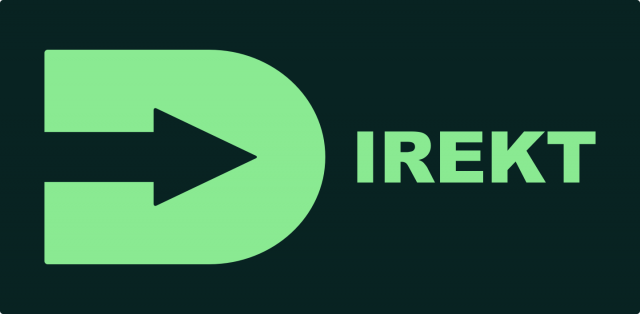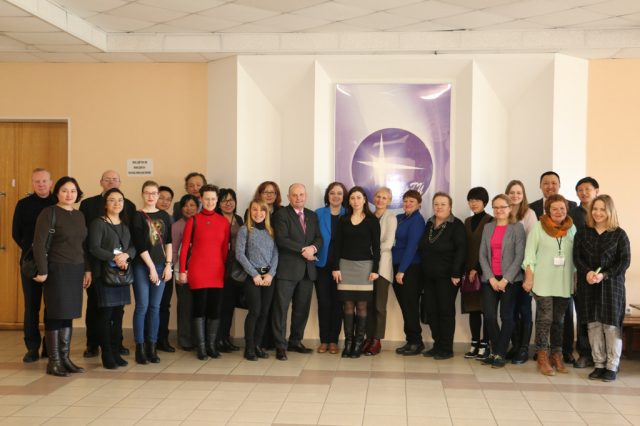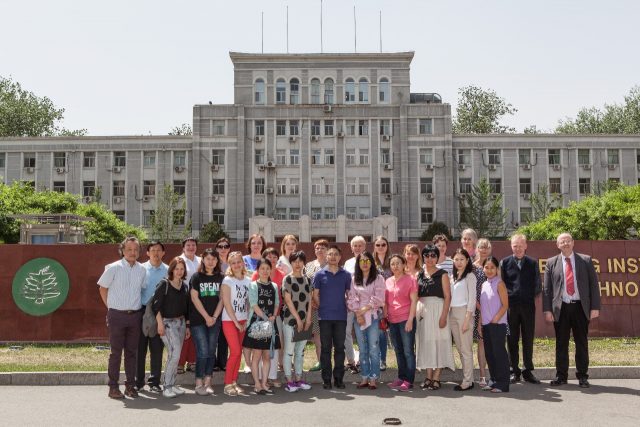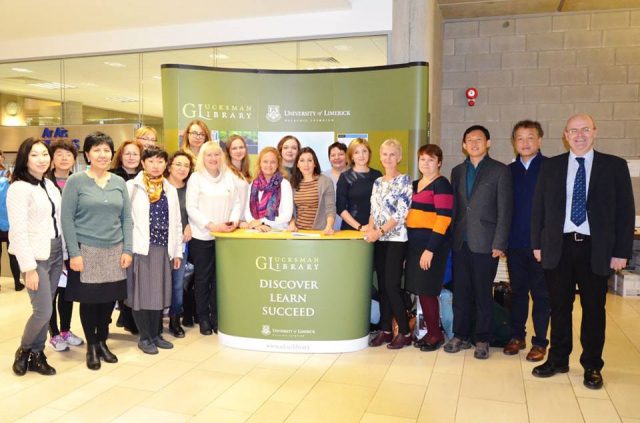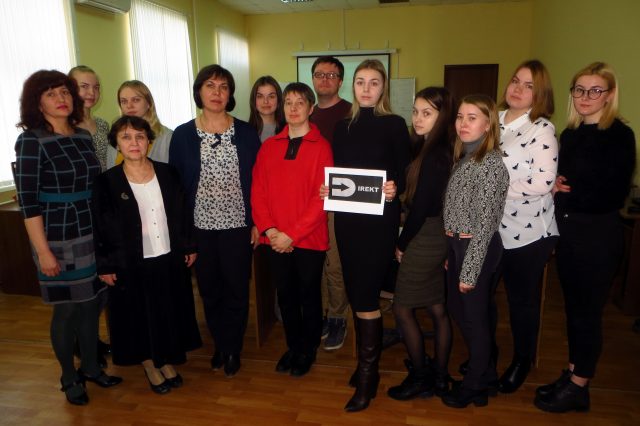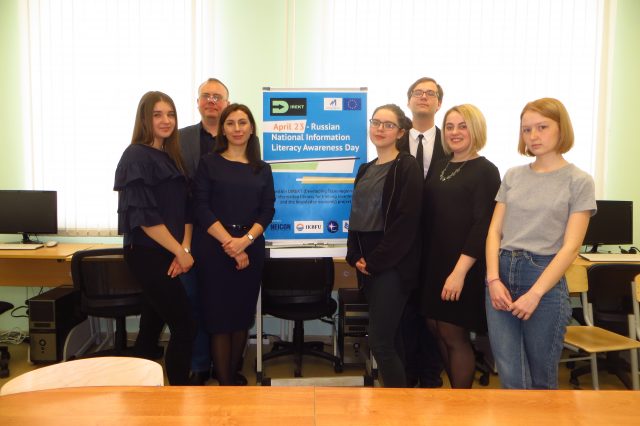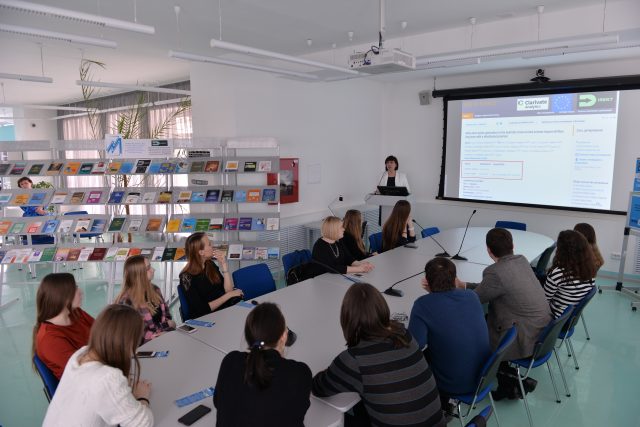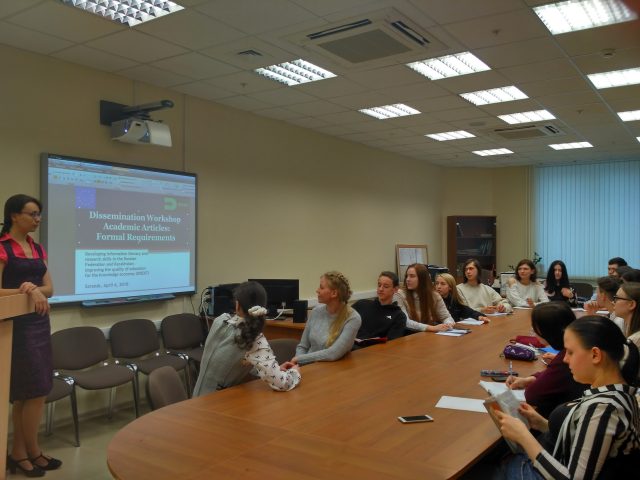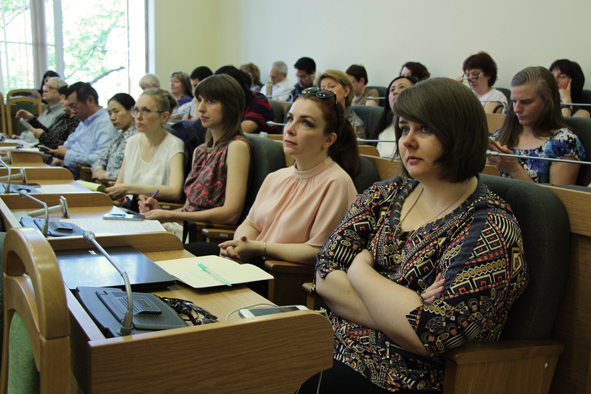
С января 2017 года факультет иностранных языков приступил к реализации проекта «Развитие трансрегиональной информационной грамотности для непрерывного образования и экономики знаний» (DIREKT CBHE 574157 Erasmus+ Capacity Building).
Цель проекта: повышение уровня информационной грамотности студентов, преподавателей, молодых ученых, сотрудников научных библиотек высших учебных заведений Российской Федерации и Казахстана с учетом положительного опыта в данной области европейских и китайских партнеров.
В рамках проекта будет разработан курс лекций и практических занятий по теме «Информационная грамотность» с последующим пилотированием в нескольких целевых аудиториях. Качественная экспертиза курса будет проводиться европейскими и китайскими специалистами во время их визитов в российские и казахские вузы. Вышеназванный курс будет включен в основные образовательные программы бакалавриата и магистратуры, предложен в качестве дополнительной образовательной программы для аспирантов и преподавателей. В результате реализации проекта повысится качество научных публикаций представляемых студентами и преподавателями МГУ им. Н. П. Огарева в зарубежные периодические издания. Срок реализации проекта – 3 года.
Руководитель проекта в МГУ им. Н. П. Огарева и координатор вузов-партнеров в РФ: Буренина Наталья Викторовна, кандидат филологических наук, декан факультета иностранных языков.
Официальный сайт проекта: https://direkt-cbhe.com/
Информация о проекте на официальном сайте МГУ им. Н. П. Огарёва: https://www.mrsu.ru/
Партнеры проекта:
- Лимерикский Институт Технологий (г. Лимерик, Ирландия) – грантодержатель, руководитель проекта
- Технический университет Дрездена (г. Дрезден, Германия)
- Университет Константина Философа в Нитре (г. Нитра, Словакия)
- Группа «Пауль Фрэнсис Ист» (г. Ульм, Германия)
- Мордовский государственный университет имени Н. П. Огарева (г. Саранск, Россия) – координатор российского консорциума вузов
- Дальневосточный Федеральный Университет (г. Владивосток, Россия)
- Балтийский Федеральный университет имени И. Канта (г. Калининград, Россия)
- Петрозаводский государственный университет (г. Петрозаводск, Россия)
- «Национальный Электронно-Информационный Консорциум» (НП «НЭИКОН») (г. Санкт-Петербург, Россия)
- Костанайский государственный университет имени Ахмета Байтурсынова (г. Кустанай, Казахстан)
- Казахский агротехнический университет им. Сакена Сейфуллина (г. Астана, Казахстан)
- Казахский национальный университет им. аль-Фараби (г. Алматы, Казахстан)
- Пекинский Технологический Институт (г. Пекин, Китай)
- Северо-западный политехнический университет (г. Сиань, Китай)
- Нанкинский Университет Науки и Технологий (г. Нанкин, Китай)
Новости проекта:
В рамках реализации проекта Developing Trans-regional information literacy for lifelong learning and the knowledge economy [Развитие транс-региональной информационной грамотности для непрерывного образования и экономики знаний], который финансировался программой Эразмус+, участниками проекта были разработаны модули по информационной грамотности и академическому письму. Доступ к скачиванию материалов открыт по ссылке: https://direkt-cbhe.com/modules/
Полный список модулей:
МОДУЛЬ 1: ENGLISH FOR SPECIFIC PURPOSES (LIBRARIES, LIBRARY TERMINOLOGY AND LIBRARY ACCESS)
Learning outcomes:
- Receptive skills outcomes:
- Learners are able to understand properly the specific language (vocabulary units and speech patterns) essential to the Library context both in oral and written formats.
- Learners are aware of the crucial library functional exponents and the most frequent active phrases for professional communication.
- Productive skills outcomes:
- Learners utilize basic Library vocabulary.
- Learners are able to pronounce the basic Library vocabulary units and speech patterns in a correct way. Learners reach A2-B1 level in English.
- Learners have ability to use specific vocabulary units and speech patterns relating to the Library context in their own speech.
- Learners are confident in communicating on general topics of the Library context including speaking about library collections, library space, library services, library opening hours, library rules of conduct, library electronic resources, finding and borrowing books from the library, renewing and returning books to the library, etc.
- Learners deliver the professional profile presentations and create promotional flyers (electronic or printed).
Материалы и поурочный план доступны для скачивания по ссылке:
https://direkt-cbhe.com/modules/module-1-english-for-specific-purposes/
МОДУЛЬ 2: IL MARKETING SKILLS FOR ACADEMIC STAFF AND LIBRARIANS — THEORY AND PRACTICE — CREATING IL AWARENESS CAMPAIGN STRATEGIES TO ADDRESS ALL STAKEHOLDERS
Learning outcomes:
- Understand and use basic concepts of Marketing.
- Be able to utilize IL marketing skills by academic staff and librarians.
- Evaluate information sources for creating IL awareness campaign strategies.
- Develop strategy plan for IL Awareness Campaign.
Материалы и поурочный план доступны для скачивания по ссылке:
https://direkt-cbhe.com/modules/module-2-il-marketing-skills-for-academic-staff-and-librarians/
МОДУЛЬ 3: INFORMATION LITERACY FOR LIBRARIANS TO TRAIN THEM TO HELP LEARNERS FIND AND USE INFORMATION EFFECTIVELY AND ETHICALLY
Learning outcomes:
- Be aware of the economic, legal and social issues surrounding the use of information. Access and use information ethically and legally.
- Identify the information need by a definite topic: understand the scale of the world of information and data, identify a search/topic question, recognize a need for information.
- Identify the sources/ types of information needed.
- Recognize the difference between print and electronic resources.
- Locate sources for the different types of materials.
- Select an effective search strategy including brainstorming for keywords and selecting subject terms.
- Perform advanced discovery tool searching, request books, access eBooks, full-text articles and other materials.
- h. Evaluate information critically.
Материалы и поурочный план доступны для скачивания по ссылке:
https://direkt-cbhe.com/modules/module-3-information-literacy-for-librarians/
МОДУЛЬ 4: INFORMATION LITERACY 2: FOR LIBRARIANS TO TRAIN THEM TO HELP LEARNERS ACCESS INFORMATION ONLINE AND IN PRINT, TO LIASE EFFECTIVELY WITH LIBRARY USERS AND ENHANCE THEIR PEDAGOGICAL AND TEACHING SKILLS
Learning outcomes:
- Be aware of various types of IL standards for librarians and IL practitioners.
- Be able to use Electronic Library Databases for research.
- Can identify and use Bibliographic software for referencing and research.
- Be competent in using Web search strategies.
- Can evaluate sources of information critically.
- Can develop teaching and pedagogical skills for teaching IL to librarians.
- Be able to foster collaboration between various groups of IL practitioners.
Материалы и поурочный план доступны для скачивания по ссылке:
https://direkt-cbhe.com/modules/module-4-information-literacy-2-for-librarians/
МОДУЛЬ 5: INFORMATION LITERACY 3 (INNOVATIVE ONLINE LIBRARY SERVICES FOR 21ST CENTURY LIBRARIANS)
Learning outcomes:
- Can structure a library website effectively;
- Can administrate, author and promote library blogs and use other social network tools;
- Assist library patrons on the use of the library OPAC, library website and other library search systems;
- Be efficient in using Web 2.0 technologies;
- Can use Library Mobile Applications and assist in their development;
- Can perform Electronic Documents Delivery services and Inter Library Loans and consult library patrons on these services;
- Can use Virtual Reference Services and critically analyze them to assist library patrons;
- Can provide library services in accordance with national and international laws and regulations in respect of copyright and intellectual property rights;
- Can use Federated Search Tools effectively;
- Can use and curate Library Guides (digital or printed) and other guides to assist library patrons;
- Can use Open Source and Open Access materials for research and study purposes, observing copyright and anti-plagiarism issues;
- Can use Institutional Repositories and their benefits;
- Be competent and aware of emerging technologies which will assist library patrons in a changing information landscape.
Материалы и поурочный план доступны для скачивания по ссылке:
МОДУЛЬ 6: INFORMATION LITERACY AND ACADEMIC WRITING I (PARAPHRASING, SUMMARIZING, APPROPRIATE CITING, WRITING TOPIC AND SUPPORTING SENTENCES, PARAGRAPHS ABSTRACTS, ETC., PRESENTATIONS OF PARAGRAPHS AND PAPERS WITH THE USE OF RESOURCES)
Learning outcomes:
- Recognize the need for information to support writing
- Effectively search and locate information using appropriate methods and sources
- Critically evaluate information sources and synthesize information from multiple sources
- Cite sources according to the requirements of style and avoid plagiarism
- Use and present information ethically
- Outline aims and objectives for writing
- Write varied sentences in standard English using academic vocabulary, including elements of grammar in academic writing
- Compose individual paragraphs, abstracts, argumentative essays, papers and theses with the proper use of the sources
Материалы и поурочный план доступны для скачивания по ссылке:
https://direkt-cbhe.com/modules/module-6-information-literacy-and-academic-writing-1/
МОДУЛЬ 7: INFORMATION LITERACY AND ACADEMIC WRITING 2 (READING AND RESEARCH; WRITING A RESEARCH ARTICLE; PREPARATION FOR PRESENTATION; PREPARATION FOR A MOCK-CONFERENCE; WRITING A FUNDING PROPOSAL)
Learning outcomes:
- Recognize the need for information literacy and educational technologies to support research and academic writing
- Effectively utilize digital publication tools and other technical aids for academic writing
- Manage one’s own academic career planning: research, academic writing, getting published and dealing with one’s own research supervisor
- Acknowledge the existence of information literacy as a component of research ethics and academic writing
- Handle Research data management: collect data; organize, structure and name data; store data and share data
- Develop project management skills in association with managing research projects
- Actively and successfully participate in conferences, develop networking skills based on information literacy
- h. Write effective funding applications
Материалы и поурочный план доступны для скачивания по ссылке:
https://direkt-cbhe.com/modules/module-7-information-literacy-and-academic-writing-2/
МОДУЛЬ 8: ENGLISH FOR PROFESSIONAL PURPOSES (WRITING A CV, EMAILS, A REPORT, A COVER LETTER AND A JOB APPLICATION; PREPARATION FOR A JOB INTERVIEW; PARTICIPATING IN A MOCK JOB INTERVIEW)
Learning outcomes:
Part 1
- Apply professional skills and competence (basic processes involved in the application process)
- Produce CVs and cover letters
- Produce written job applications and understand relevant job application procedures in particular those common in the English-speaking world
- Deal successfully with job interviews
- Effectively apply professional writing skills for positions available in the job market
- Demonstrate ability to interview and be interviewed in pairs or as individuals.
Part 2
- Apply professional writing skills and competence (business correspondence and reports)
- Produce appropriate correspondence and reports
- Write formal correspondence, reports and emails effectively considering the relevant style, structure and format
Материалы и поурочный план доступны для скачивания по ссылке:
https://direkt-cbhe.com/modules/module-8-english-for-professional-purposes/
В рамках реализации проекта «Развитие трансрегиональной информационной грамотности для непрерывного образования и экономики знаний» (DIREKT CBHE 574157 Erasmus+ Capacity Building) МГУ им. Н. П. Огарева получил право доступа к уникальной платформе LibGuides, которая используется для создания и размещения различных ресурсов и контента, а также обмена знаниями. Это самая популярная и простая в использовании платформа веб-публикации и редактуры контента, а том числе для библиотек. LibGuides используют для сбора знаний и обмена информацией, организации учебных и тематических ресурсов, а также для создания и управления веб-сайтами. Ознакомиться с платформой можно по адресу https://direkt-cbhe.com/direkt-online-information-literacy-module-platform/
* * *
В рамках реализации проекта Developing Trans-regional information literacy for lifelong learning and the knowledge economy [Развитие транс-региональной информационной грамотности для непрерывного образования и экономики знаний], который финансировался программой Эразмус+, участниками проекта были разработаны модули по информационной грамотности и академическому письму. Доступ к скачиванию материалов открыт по ссылке: https://direkt-cbhe.com/modules/
* * *
Визит сотрудников ФИЯ в Пекинский технологический институт
Визит преподавателей ФИЯ в Технологический институт Лимерика (Ирландия) в рамках проекта Erasmus+
National Awareness day — Информационный день по проекту
Debates within National Awareness Day (Erasmus+, Project DIREKT)
Молодых ученых вуза обучили информационной грамотности

